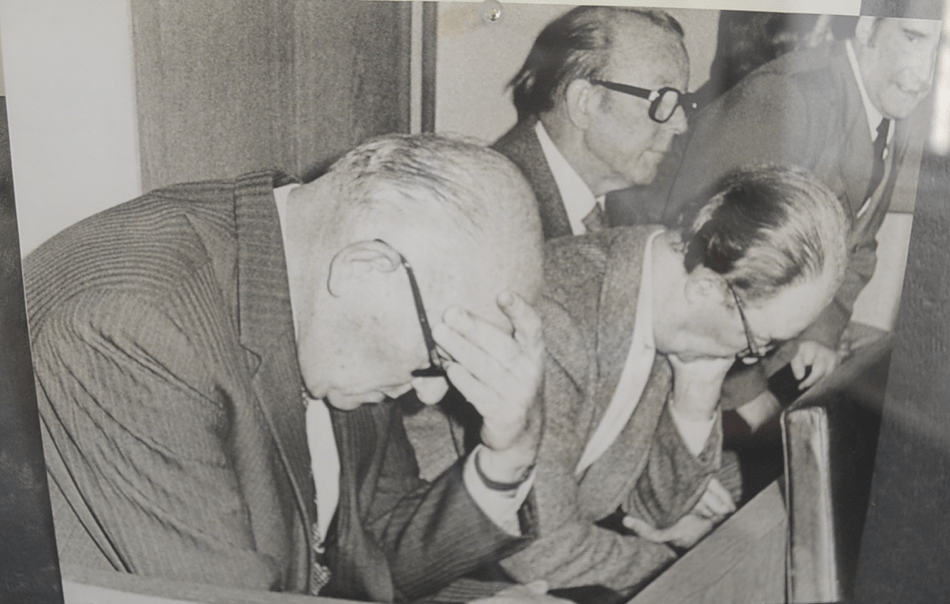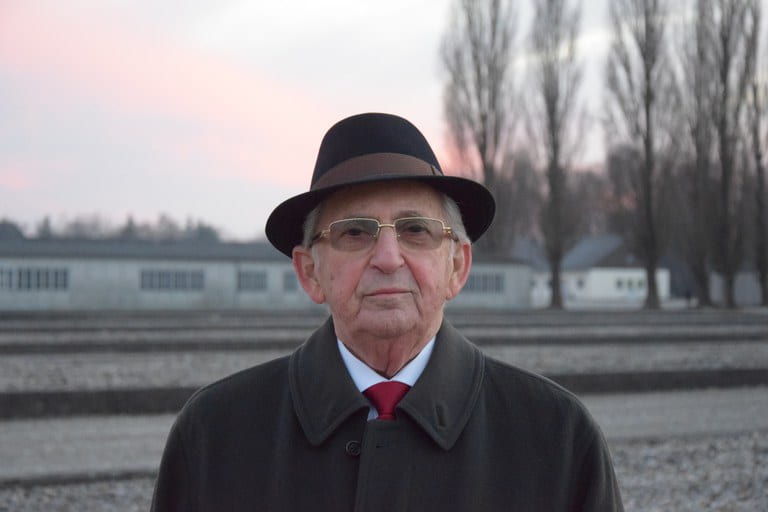
Germany’s guilt and responsibility from the Second World War is still an ongoing issue. While an official authority is fighting to hold the last Nazi-generation responsible, an eyewitness and WWII survivor is more concerned about warning younger generations. Overall, Germans predominantly no longer feel “guilty” today.
By Caroline Kleine-Besten
“I had an older brother, he was 14 years old and while shopping he was shot dead with another 25 children. I had a little brother, six years old, I last saw him in Stutthof in 1944. On July 27, they [his little brother and his mother] were taken out of Stutthof and gassed in Auschwitz on the same day. These are things you never forget.”, says Abba Naor.
As the son of a Jewish family in Lithuania, Abba Naors’ childhood ended when he was 13. At 92 years of age today, what he had to experience from his deportation in 1941 until the end of the Second World War (WWII) is still very present.

Even 75 years after the end of WWII, the extent of the Holocaust, the mass extermination of the Jews by the National Socialist regime under Adolf Hitler is incomprehensible. Therefore, the question of guilt is still a topic of discussion in Germany today.
Infobox: Over 6 million Jews were killed by the Nazi regime between 1933 and 1945 because they were declared as an “inferior race” and blamed for grievances in Germany.
Since that time much is being done by the official German side to keep the memory alive. For example, it is compulsory for schoolchildren in the federal state of Bavaria to visit a concentration camp during their school years, denial of the crimes committed during WWII is an offence in Germany and is punishable by imprisonment, and the Federal Government provides additional financial support in the higher double-digit million euro range for activities aimed at coming to terms with the Nazi era.
Infobox: The government supports the commitment of the federal states by providing around 70 million euros between 2018 and 2020. In addition, concrete project fundings are supported in the single-digit million euro range.
Drawing a line in the sand is not an option for Germans
Anke Fiedler, representative of the German project team of a European research project called “RePAST”(Revisiting the Past, Anticipating the Future), which investigates how European countries deal with their past in the context of European integration, gives an insight into the preliminary results for Germany and describes:
“Hardly anyone feels guilty anymore. Germans do not want to be perceived and criticized as guilty in the process of coming to terms with the past, but many people feel responsible for remembering the past.”
More than 250 interviews with people from all over Germany between 18 and 92 years of age from various educational backgrounds and milieus also revealed insights to the collective memory in the future:
“Many of those interviewed expressed a desire for a change in the culture of memory. Not necessarily away from the commemoration of National Socialism and the Holocaust, but towards a changed, all-encompassing remembrance without the ‘moral cudgel’ that resonates with it.”
The time-consuming search for the last responsible persons
Even though there is much discussion about the past today, there are still people for whom the past remains present as long as there are still survivors. The “Central Office of the State Justice Administrations for the Investigation of National Socialist Crimes” in Ludwigsburg Southern Germany have been making a name for themselves as “Nazi hunters” since their foundation in 1958. Their aim is to conduct preliminary investigations into former National Socialists (NS). As soon as a set of crimes has been investigated, it is handed over to the respective public prosecutor’s office in Germany, which can then initiate an investigation. Therefore, the question of guilt and responsibility is still tangible here.
Infobox: In the Nuremberg Trials (1945-1949), after WWII, leading representatives of the Nazi regime were convicted by an international military tribunal and an American military tribunal primarily to prison sentences, but also death sentences. Further trials in the respective occupation zones followed.
As a basic motivation for the work, after 75 years of searching for participants, the deputy director Thomas Will describes: “This is a prosecution like any other, murder is not time-barred, that’s the basis”.

As no crime scenes in this sense are available any more and the number of witnesses is decreasing, the pre-investigation work today concentrates mainly on written information about the various concentration camps. It is attempted to identify the persons who worked in these concentration camps by means of assignment lists. Therefore, the Central Office cooperates with other authorities abroad, which also deal with NS crimes today. For example, the Human Rights and Special Prosecutions Section (HRSP) in the USA and similar agencies in Canada, and Poland. There has also been cooperation with Danish authorities in cases where guilty persons were suspected in Denmark.
Everyone officially involved in the “extermination machinery” is guilty
In 2011, the question of who among the former National Socialists should still be sought under criminal law has changed once again. In the past, they had let assistants or “recipients of orders” get off more or less unpunished in favour of the prosecution of “major offenders”, on the one hand, because otherwise there would simply have been too many defendants on the other hand because this also gave rise to the hope of winning witness statements against higher-ranking defendants and accused persons.
Today, no concrete deeds have to be proven in order to prosecute a person, but everyone who has obviously participated in an “extermination machinery” has made himself guilty. That is why today, above all, assistants are being wanted too.
“[The assistant] also knows that by passing on radio messages about arriving trains and so on he supports the whole action. That’s close enough to be condemned,” the Deputy Head of the Central Office Thomas Will explains.
All in all, Will sees guilt as something individual, but nevertheless he emphasizes: “I think it is a moral responsibility we have, that we have to face the guilt that this country, this community has incurred in the past, that we cannot simply put it away”.
Abba Naor: “The real culprits are gone”
For the Holocaust survivor Abba Naor, the efforts of the headquarters come too late overall: “I don’t think much of the fact that a 96-year-old is being sentenced today. That is unfair, why did they wait, do they want to redeem themselves today? The time is already past.”
Only recently, a trial against a guard of the concentration camp Stutthof (Poland) was held in Hamburg, the camp where Naor had last seen his mother and little brother, where the Central Office had done the preliminary work. Naor was therefore also invited as a witness, but had declined. He is no longer in favor of condemning these persons. It was more important to make clear to the descendants “who their grandfather really was”.
The guilt becomes a warning
Today the contemporary witness Abba Naor is neutral towards Germany and no longer regards the Germans as guilty on the whole. Instead, the Holocaust survivor regularly comes to Munich to report on his experiences in schools. He is not concerned with guilt, because the children have nothing to do with it anymore in his opinion. Above all, he comes to warn against “false prophets” and to explain how bad it can be if one is not careful. As false prophets he perceives people who claim that in former times everything was better and who instrumentalize religion.
In fact, in 2017 for the first time a right-wing populist party, the Alternative für Deutschland (AfD), entered the German parliament, the Bundestag. AfD officially warns against the “Islamization” of Germany and some of its members repeatedly criticized the German culture of remembrance with the term “cult of guilt”, most recently on this year’s Holocaust Memorial Day in January. According to current surveys, the AfD receives about 10% of the votes and is the largest opposition party in the Bundestag after the 2017 elections.
When asked what he thinks about the fact that in Germany, among other countries, there has been an increase in right-wing conservative perspectives, Abba Naor answers: “That hurts. […] I have to say that I never imagined that this would happen in my lifetime.”
Who deals with the past of WWII in a concrete way?
Get an insight into the visitor study of the
Dachau concentration camp memorial site here.